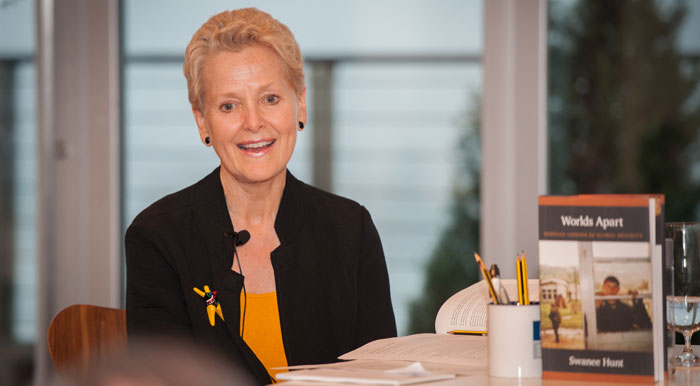
“Don’t be afraid to say there is an aggressor here,” Swanee Hunt, Chair of the Institute for Inclusive Security, told an IPI audience while discussing her new book, Worlds Apart: Bosnian Lessons for Global Security. Ms. Hunt served as the US Ambassador to Austria between 1993-97 and hosted negotiations and meetings focused on stabilizing the neighboring Balkan states.
She criticized the notion of an “even-handed” response, which was adopted during the conflict by the US government. Too much time was spent being concerned about being neutral and even-handed, she said. “We started thinking that even-handed meant that you don’t recognize that 90 percent of the atrocities are committed by one group. Even-handed would be to see all aggressors as they are.”
She spoke of the lessons she drew from the Bosnian war, and how, two decades after the conflict, these lessons are relevant to today’s conflicts. She recalled that she kept telling US President Bill Clinton at the time, “You have got to intervene. You have got to intervene now.” One lesson from that is to “embrace responsibility,” she said. “Be willing to intervene, lean forward. Intervention isn’t necessarily militarily, but sometimes it is.”
Ambassador Hunt, who recently visited Bosnia, for the 25th time, described the situation today as “mixed.” The Dayton peace accords, she said, created a “totally unworkable” political system, where governance positions were divided along ethno-religious lines. As a result, Bosnia is “politically frozen.” “We have set up a system that was doomed to paralysis,” she said. “In terms of the reconciliation, there’s been some justice that’s been meted out, but it’s been so, so slow,” she said. However, she added, “There’s a whole new generation that can hardly remember the fighting.”
“Reconciliation is a very, very personal thing. It comes from a sense of confession, a sense of transitional justice like you might have in South Africa, or where there is a truth-telling,” she said. “I have become a real believer in that community-based justice, like you see in Rwanda for example. It’s not perfect by any means but when you look at what the choices are, I think there’s a lot to be said.”
Emphasizing the need to have inclusive peace negotiations, particularly involving women and civil society, she said, “When you talk to someone who’s doing negotiations about that, half the time they just blanch. They say, ‘This was already going to be hard. Do not complicate this any further.’ But the point is, if you are going to have an agreement that lasts, it’s going to be more complicated than you imagined.”
Recalling her experiences speaking with Bosnians at the time, she said, “When I would go, I would meet, and just listen, going from one friend’s house to her friend’s house to his friend’s house, taking in stories, finding out that there was an association of 40 women’s groups…All of this was information that the US embassy to Bosnia didn’t have.”
Having such local allies in creating peace was important. “We’ve got to have allies who are inside the country. Many of those will be those who are not on the list at all,” she said. “We think we know. We had one of the largest intelligence operations in Vienna and we were so wrong so often. So often, because we weren’t really finding out what was really going on.”
In meetings with other policy makers, she would hear that “those people [in the Balkans] cannot live together. They’ve been fighting for centuries,” pointing out that the last time there was conflict in the Balkans, France and Germany were fighting as well. “We based a significant part of our response to the war on that stereotype; that there was nothing we can do about those people.”
Concluding with a hopeful message, Ambassador Hunt described a conversation she recently had with a mother whose son, Sameer, was killed in the war. The mother, she said, told her that “when they killed Sameer, they killed themselves. But I have forgiven them, so I live.”
Making special remarks, Udo Janz, who served as the UNHCR representative in Bosnia, echoed Ambassador Hunt’s message, saying that women’s peace groups helped “break the ice” that established peace, and also said that Swanee Hunt is a household name for women in Bosnia today for her work on achieving gender parity as a means to peacebuilding.
Moderating the discussion was Jordan Ryan, Assistant Secretary-General and Director of the Bureau for Crisis Prevention and Recovery at UNDP. Mr. Ryan and Ambassador Hunt were introduced by Pim Valdre, IPI Director of External Relations.
Interview with Swanee Hunt, Former Ambassador and Author of New Book on Bosnia
Watch event:







